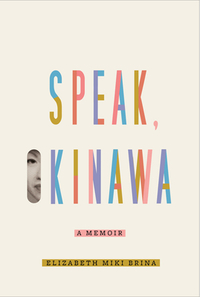Take a photo of a barcode or cover
More of a 2.75/5, but rounding up.
As someone who is also part Okinawan/part white/all American, I personally felt that the author took a lot of time speaking for native Okinawans, even though she has been to the island less than 5 times (at the time of writing) and did limited research (based on her cited sources). The liberties she took with retelling Okinawa’s complex history did not reflect the proper amount of scholarship for the amount of history she purported to tell. Speaking for native Okinawans, instead of just highlighting her own perspective and how she felt as she learned some of the history, seems in line with the author’s tendency to espouse and act upon problematic viewpoints. I spent most of the memoir feeling that she was not accountable for the actions of her past self throughout her life and had not adequately reflected on her contributions to white supremacy. Accountability is key to memoirs, and I felt that was missing, barring a few sparse apologies to her mom.
That being said, I did relate to some of her struggles as one of the only women of color in mostly white communities, and I hope she continues to learn and reflect. She seems to be making an effort but wrote this book before her thoughts were fully fleshed out. If she had stuck to her story and not summarized so much of Okinawan history, I feel this would have improved the book.
As someone who is also part Okinawan/part white/all American, I personally felt that the author took a lot of time speaking for native Okinawans, even though she has been to the island less than 5 times (at the time of writing) and did limited research (based on her cited sources). The liberties she took with retelling Okinawa’s complex history did not reflect the proper amount of scholarship for the amount of history she purported to tell. Speaking for native Okinawans, instead of just highlighting her own perspective and how she felt as she learned some of the history, seems in line with the author’s tendency to espouse and act upon problematic viewpoints. I spent most of the memoir feeling that she was not accountable for the actions of her past self throughout her life and had not adequately reflected on her contributions to white supremacy. Accountability is key to memoirs, and I felt that was missing, barring a few sparse apologies to her mom.
That being said, I did relate to some of her struggles as one of the only women of color in mostly white communities, and I hope she continues to learn and reflect. She seems to be making an effort but wrote this book before her thoughts were fully fleshed out. If she had stuck to her story and not summarized so much of Okinawan history, I feel this would have improved the book.
emotional
informative
reflective
medium-paced
I loved this story. The intertwining of the authors personal accounts of her life with her mothers and the people of Okinawa was incredibly well done. I was moved by the story and informed on Okinawa history. Please read this.
emotional
funny
informative
sad
tense
medium-paced
emotional
hopeful
reflective
sad
medium-paced
I cried reading this book. I connected so much with the author’s fraught relationship with her mom over their language barrier, among other factors. I learned a lot about Okinawan heritage and how it is separate from Japanese culture. In my opinion, this was a more powerful piece about growing up mixed race than the popular “Crying in H Mart” by Michelle Zauner (which I also loved). American imperialism over the Pacific region, in this case over the island Okinawa, is so pervasive and problematic. However, reading how Elizabeth’s mother chose to marry her father and start a new life in the States is truly an act of courage and resilience (albeit, the only unfortunate option for her to escape poverty in Okinawa).
dark
hopeful
informative
reflective
sad
tense
fast-paced
emotional
funny
informative
reflective
sad
medium-paced
emotional
hopeful
reflective
sad
Listened on audiobook. A story about a woman whose mother is from Okinawa and father from American and how she learned to love the history and family she has.
Reading 2021
Book 37: Speak, Okinawa: A Memoir by Elizabeth Miki Brina
I listened to this book on Audible. Chose it since we were stationed on Okinawa for three years.
This book is part memoir and part history of the island of Okinawa. From Amazon: "A searing, deeply candid memoir about a young woman's journey to understanding her complicated parents—her mother an Okinawan war bride, her father a Vietnam veteran—and her own, fraught cultural heritage.
Decades later, Elizabeth comes to recognize the shame and self-loathing that haunt both her and her mother, and attempts a form of reconciliation, not only to come to terms with the embattled dynamics of her family but also to reckon with the injustices that reverberate throughout the history of Okinawa and its people. Clear-eyed and profoundly humane, Speak, Okinawa is a startling accomplishment—a heartfelt exploration of identity, inheritance, forgiveness, and what it means to be an American."
As I said, since we lived on Okinawa for three years this book caught my attention immediately. The book delved into the troubled history with the military bases that are still on the island and that was something else that drew me to the book. Speak, Okinawa alternated between the author's personal struggles with being part Okinawan and part American with the history of the island. A story of one person's reckoning with their identity. This was a personal listen for me, and I would recommend to my friends that were stationed there as well. My rating 4 ⭐.
Book 37: Speak, Okinawa: A Memoir by Elizabeth Miki Brina
I listened to this book on Audible. Chose it since we were stationed on Okinawa for three years.
This book is part memoir and part history of the island of Okinawa. From Amazon: "A searing, deeply candid memoir about a young woman's journey to understanding her complicated parents—her mother an Okinawan war bride, her father a Vietnam veteran—and her own, fraught cultural heritage.
Decades later, Elizabeth comes to recognize the shame and self-loathing that haunt both her and her mother, and attempts a form of reconciliation, not only to come to terms with the embattled dynamics of her family but also to reckon with the injustices that reverberate throughout the history of Okinawa and its people. Clear-eyed and profoundly humane, Speak, Okinawa is a startling accomplishment—a heartfelt exploration of identity, inheritance, forgiveness, and what it means to be an American."
As I said, since we lived on Okinawa for three years this book caught my attention immediately. The book delved into the troubled history with the military bases that are still on the island and that was something else that drew me to the book. Speak, Okinawa alternated between the author's personal struggles with being part Okinawan and part American with the history of the island. A story of one person's reckoning with their identity. This was a personal listen for me, and I would recommend to my friends that were stationed there as well. My rating 4 ⭐.
An intimate memoir of a daughter of an Okinawan mother and a white American father who was a GI in Okinawa in 1974. Growing up in Rochester, NY, she found her uneducated mother’s limited English embarrassing, and was drawn to her controlling father. In her 30s she traveled to Okinawa, and finally comes to understand the challenges her mother has faced her whole life. The story is intermixed with first-person narratives of Okinawa history, including Perry forcing a treaty on the kingdom in 1853, the calamitous Battle of Okinawa in 1945, when almost 1/2 of the island population was killed, and the burden of the continuing presence of American military bases.
It was okay, I don't highly recommend it. There are some good points about the way Asian-Americans have been treated in the late 20th century, internalized racism, and interesting things about Okinawa, a place I love. The author is ruthless in assessing her past mistakes, but spending so much time with this dysfunctional family got tiring. Her descriptions of Okinawa history did not go beyond a surface level of understanding, and although she has emotional reconnections with her Okinawa relatives, she never is able to communicate beyond an elementary level, so gained no real insights about their experiences or Okinawa society.
It was okay, I don't highly recommend it. There are some good points about the way Asian-Americans have been treated in the late 20th century, internalized racism, and interesting things about Okinawa, a place I love. The author is ruthless in assessing her past mistakes, but spending so much time with this dysfunctional family got tiring. Her descriptions of Okinawa history did not go beyond a surface level of understanding, and although she has emotional reconnections with her Okinawa relatives, she never is able to communicate beyond an elementary level, so gained no real insights about their experiences or Okinawa society.





